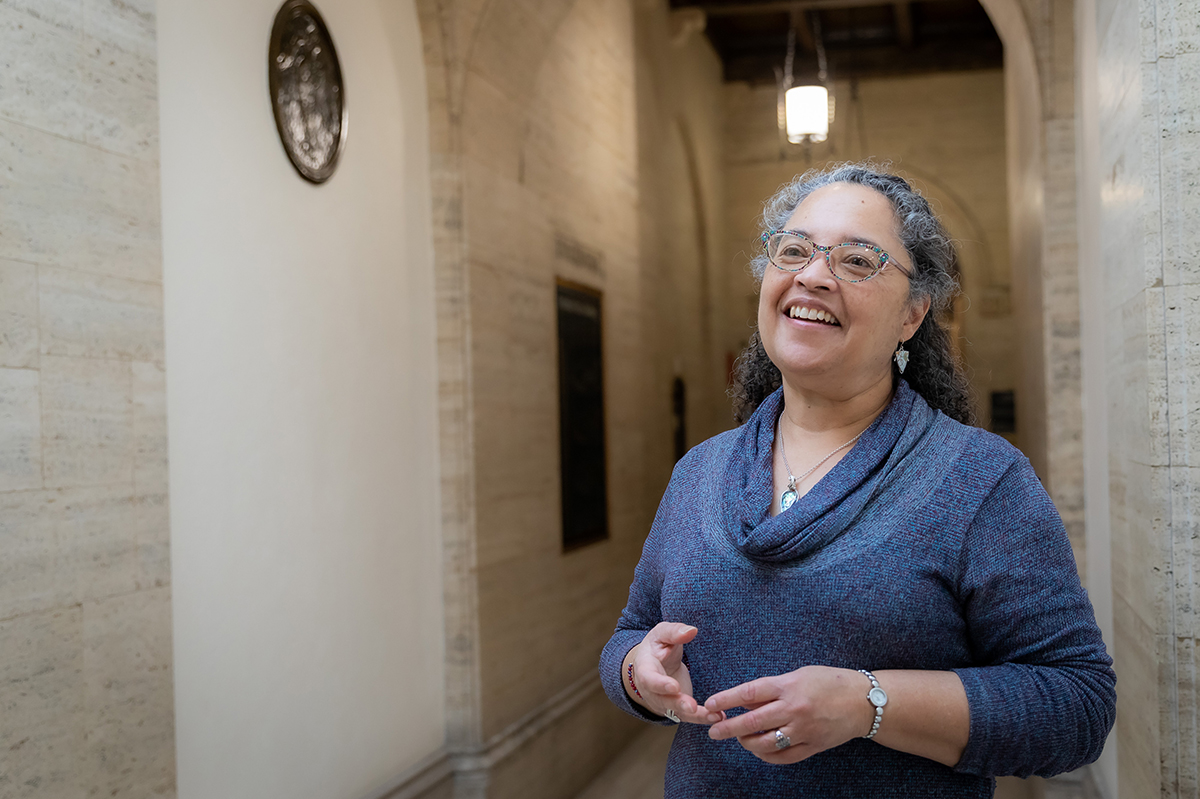 Christina Rivers, associate professor of political science and director of DePaul's Institute for Restorative Educational Engagement (Photo by Jeff Carrion/DePaul University)
Christina Rivers, associate professor of political science and director of DePaul's Institute for Restorative Educational Engagement (Photo by Jeff Carrion/DePaul University)On March 19, Illinois hosts its primary for the fall 2024 U.S. election. Christina Rivers, a Vincent de Paul Professor and associate professor of political science, believes criminal justice, global conflict and presidential candidates’ ages will be key topics for voters.
In this Q&A, Rivers shares advice for first-time voters. She also discusses her work as inaugural director of DePaul’s Institute for Restorative Educational Engagement.
The country is preparing for what seems to be another contentious election year. What are some of the big topics you expect to see leading to November?
At the presidential level, we are seeing unprecedented candidacies in terms of age. Both Joe Biden and Donald Trump are the oldest presidential candidates we’ve ever had. It also is impressive that a candidate who is not campaigning is winning – for Trump to show up or not show up and garner significant support is jarring. As political scientists, we were not ready for this. They didn’t teach us about this in school.
Another big focus will be how Biden threads the needle between issues related to his age and what he has delivered as president, as well as how he’s dealing with two international conflicts, particularly Palestine and Israel.
What advice do you have for first-time voters?
It can be frustrating to watch what’s happening but don’t give up. I cut my civic engagement teeth during the Watergate scandal, which really had us young people thinking ‘Why bother?’. I identify with what young people are feeling, but the biggest thing I want people to realize is there is more on the ballot than the presidential election. Most of what is important, where it’s possible to make changes, is called the down ballot.
We are directly impacted by state and local laws and policies, as well as elected officials such as judges and treasurers. In Chicago, we also elect judges and that can make the ballot very long and daunting. However, there are great voter guides, such as
Injustice Watch and
Chicago Votes, that provide detailed information about candidates’ professional records including their decisions that have been overturned. There are many other more general guides too. And you can bring your homework - the research you’ve done - with you into the voting booth. I always bring my resources with me.
Finally, take advantage of
early voting if you can. Don’t feel like you must wait for election day, especially when it falls during finals week or break. Folks who are not yet registered to vote can do so and vote on the same day. See
here for more details.
Civic engagement is one of the pillars of DePaul’s Institute for Restorative Educational Engagement. Can you tell us more about this new institute?
The idea came about during the 2019-20 academic year while I was a
DePaul Presidential Fellow. One of my proposals was to expand what the university is doing in terms of prison education. The Steans Center and Community Service Studies program launched the
Inside-Out Prison Exchange Program at Stateville Correctional Center in 2012. As far as I understand DePaul was the first university to teach there consistently in about 20 years. I began teaching there in 2016 and established a law and policy think tank after the course ended. The think tank began revising class projects into bill proposals. One of those bills, the
Re-Entering Citizens Civic Engagement Act was signed into law in 2019. That year I was a Presidential Diversity Fellow, which allowed me the time to create models of how to expand DePaul’s prison ed programming.
Out of that fellowship came the Institute for Restorative Educational Engagement (IREE). The institute will continue the legacy of St. Vincent's and St. Louise's ministry to the incarcerated by expanding DePaul's prison ed programming, providing services to students who have been incarcerated as well as those with loved ones who are incarcerated, and formalizing our civic education and engagement work with system-impacted community members.
What impact can this institute have on the DePaul and Chicago communities?
About 95% of people in jail, pre-trial, are eligible to vote, but almost none exercise that right because they don’t have easy access to the ballot, or they aren’t aware of their eligibility.
Two-thirds of those incarcerated in Illinois come from the same few neighborhoods in Chicago. The vast majority of people in prison are low-income and/or people of color. They are not allowed to vote while incarcerated, and most are unaware of their voter eligibility after release. They also have very few college education opportunities while inside.
These realities amplify the Vincentian call to work with those whom many in society would rather forget about. I hope IREE will motivate DePaul to become a leader in promoting more humane and transformative approaches to harm, accountability, safety, justice, and community.
In the coming months, the Institute for Restorative Education Engagement will team with podcast Change Agents, co-executively produced by DePaul’s Judith McCray, on a rollout series for the institute. More information will be shared on the Change Agents website when it is available.